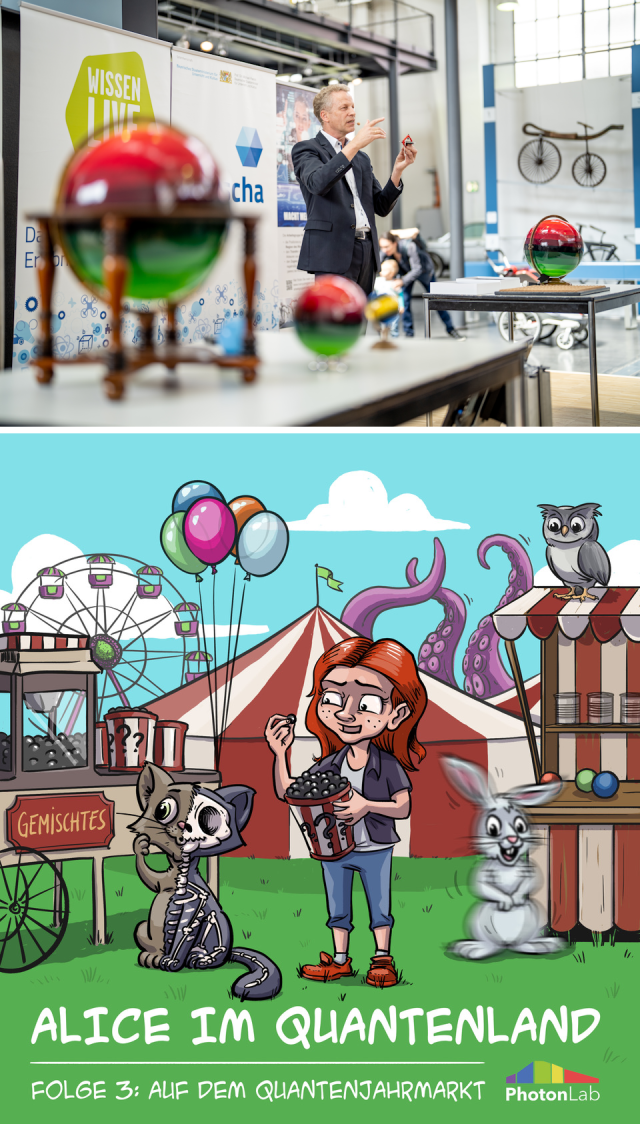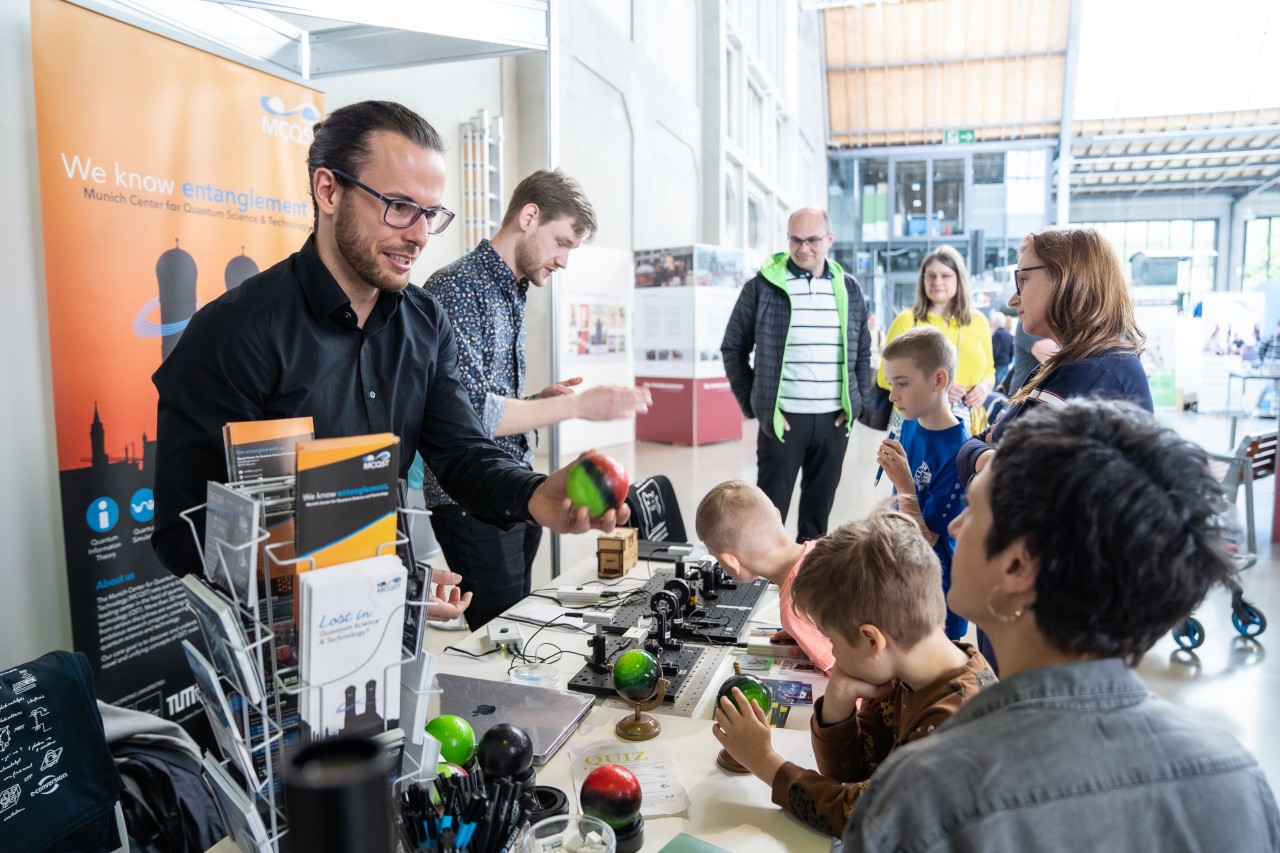28 June 2024
- 30 June 2024
from 9:00
to 17:00
Meet us at the FORSCHA at Deutsches Museum Verkehrszentrum!
Address / Location
Deutsches Museum Verkehrszentrum und Alte Kongresshalle
Theresienhöhe
80339
München
Show Map
Hide Map
MCQST at FORSCHA 2024
Meet us at the FORSCHA (Münchner Wissenschaftstage) to experience first hand the fascination of quantum physics.
Meet us at the “Excellence Clusters in Munich” Booth
Where will we get our energy from in the future? What is a quantum computer? And does it work? How does Alzheimer's disease develop? And what actually happened after the after the big bang? These and many other questions are being addressed by the researchers of the four Munich Clusters of Excellence e-conversion, MCQST, SyNergy, and ORIGINS. At the joint booth you can expect exciting experiments to try yourself and take part in a fun quiz with cool prizes!
MCQST will give you a look into the world of a quantum scientist with virutal reality! Strap on a cutting-edge virtual reality headset and step right into the lab yourself. You will also have the opportunity to whitness how diamonds can be used to measure magnetic fields with NV centers. These centers form when a nitrogen atom replaces a carbon atom in the diamond’s structure, creating a tiny magnet known as a spin. These spins can detect nearby magnetic fields, acting as ultra-small sensors. Using millions of NV centers, researchers are able to measure large magnets. Advanced experiments can read individual NV centers, creating detailed magnetic field maps for use in chemical research and drug development.
Join us to explore, experiment, and delve deeper into the quantum world—there's so much to discover!
Exciting lectures offering insight into the world of quantum physics

Friday, 28 June 2024, 12:45 - 13:45
The quantum world enables many technical applications, ranging from lasers to future quantum computers, which are currently being developed worldwide. While today's computers are based on the processing of many bits (with the values 0 or 1), quantum computers are based on the interaction of quantum bits.
A major hurdle in understanding the quantum world and the quantum technologies based on it has so far been the lack of a clear (but nevertheless exact) visual representation. In his lecture, Prof. Dr. Steffen Glaser demonstrates how the rules of the quantum world can be made " tangible" with the help of "quantum pearls". The amazing effects on which quantum technology is based, such as the entanglement of quantum bits, can thus be visualised. After the lecture, visitors will have the opportunity to experience the quantum bead game in more detail.
Alice in Quantum Land. An audio play for young and old, episode 3: At the quantum fair | PhotonLab
Saturday, 29 June 2024, 16:00 - 16:45
Alice in Quantum Land is a radio play for all ages that packs the mysterious phenomena of quantum physics into exciting adventures and instructive stories. In the third episode, Alice and her companions Schrödinger and Rabbit end up at the quantum fair. If a funfair like this attracts visitors with sensations and attractions in the normal world, there are plenty of these extraordinary "weirdnesses" in the quantum world. Because nothing here is the same as we are used to in our everyday lives, as the laws of nature behave completely differently in the world of the smallest particles. This is what Alice and her friends experience when they walk through a labyrinth. The search for the exit turns out to be very strange and difficult, as markers and signposts are no longer useful. And the rules for playing "Quaninchen" and throwing tins are obviously very different to those at home. Even the treats you can snack on here leave you in the dark at first. Sometimes life is like a box of chocolates: you never know what you're going to get.
Quantum computing up close: Live demonstration of a 3-qubit quantum computer | Dr. Judith Gabel, QL3 & LMU München
Sunday, 30 June 2024, 13:00 - 14:00
Have you always wanted to experience a quantum computer up close? In this lecture you will have the opportunity to do so and learn how a quantum computer works during a live demonstration. The media often report on quantum computers, which work very differently to conventional computers and could work more efficiently in certain circumstances in the future. Quantum computers are often shown as huge systems in special laboratories that fill entire rooms. However, this is not necessarily the case, as their appearance and size depend on the technology used to realise them. Dr Judith Gabel will bring a compact quantum computer with three qubits to her presentation, which is based on the technology also used in magnetic resonance imaging. Although this technology only enables the development of very small quantum computers, it was historically used for the first real quantum computations.
In her lecture, Dr Judith Gabel not only explains the basics of quantum computing, but also demonstrates the fundamental principles and algorithms live on the 3-qubit quantum computer. After the lecture, you will have the opportunity to run a quantum algorithm yourself and experience how quantum computing works in real time.
Click here for more info about the event:
